People are consistent when it comes to humour. You meet someone and know pretty quickly where on the humour continuum they stand.
Not that you need a sense of humour. A University of Karachi study found that, “there is no relationship between a sense of humor and mental health” (Tariq & Khan, 2013, p 338).
 In today’s world, where banks create money out of nothing and charge interest for it, where a few people are hilariously rich and politicians are in their pockets, where a GDP is more important than our biosphere and spandex is suitable for any body type – if you didn’t laugh, you’d probably cry.
In today’s world, where banks create money out of nothing and charge interest for it, where a few people are hilariously rich and politicians are in their pockets, where a GDP is more important than our biosphere and spandex is suitable for any body type – if you didn’t laugh, you’d probably cry.
Tears of laughter and sadness look alike, but sad tears make you feel sorry for yourself and happy tears take you out of yourself. Humour can re-frame the world in a light that’s enjoyable (instead of deplorable).
In psychology “framing” refers to how we “react to a particular choice in different ways depending on how it is presented; e.g. as a loss or as a gain” (Wikipedia). How we frame predicts enjoyment potential.
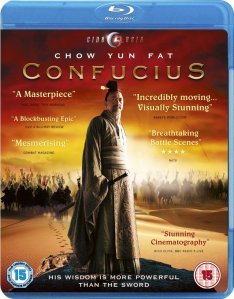 Confucius gave two answers to the same question to two students. Zilu asked, “May one immediately put into practice what one has learned?” The Master said something about one’s father and brothers. When Ran Yǒu asked the same question, the Master said, “Yes, one may” (11.22, Book XI, Analects). Teachings are correct in relation to the student. So is humour.
Confucius gave two answers to the same question to two students. Zilu asked, “May one immediately put into practice what one has learned?” The Master said something about one’s father and brothers. When Ran Yǒu asked the same question, the Master said, “Yes, one may” (11.22, Book XI, Analects). Teachings are correct in relation to the student. So is humour.
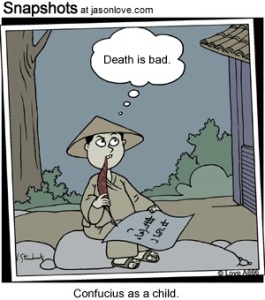 Confucius said, “Everything has beauty, but not everyone sees it.” The same goes for humour.
Confucius said, “Everything has beauty, but not everyone sees it.” The same goes for humour.
Each of us is born into a situation. We inherit a genetic blueprint not of our choosing.
If you have mild brain damage and grow up in a bad home, that’s the hand you’re dealt.
 People come to the table with different ways of seeing the world and different personalities and capacities to make decisions. You could be rich and miserable, poor and miserable or in a miserable middle.
People come to the table with different ways of seeing the world and different personalities and capacities to make decisions. You could be rich and miserable, poor and miserable or in a miserable middle.
Misery is not totally monetarily related.
Books like A Fine Balance (2001) and Tortilla Flat (1935) show how people prevail under any circumstance. Despite incredible hardships characters are amused by things that are easy to get and all around (like low hanging fruit).
 Wit can be barbed and satire harsh, but humour expresses comfortable feelings without unpleasant effects on others. Humour can help you bear “what is too terrible to be borne” (Tariq & Khan, p. 333).
Wit can be barbed and satire harsh, but humour expresses comfortable feelings without unpleasant effects on others. Humour can help you bear “what is too terrible to be borne” (Tariq & Khan, p. 333).

Mel Brooks (a comedian) said, “Life literally abounds in comedy if you just look around” and Steve Martin (a sort of comedian) said, “Comedy is the art of making people laugh without making them puke,” meaning: the degree to which something is funny suggests that almost anything could be funny, it’s just a matter of sensing it (without vomit).
To be funny (and not scary) humour has to be benign. It can be dark but not too dark. It can be offensive but not too offensive.
 A teeny weeny minority (in number, not stature) don’t find anything funny. An even teenier (and weenier) minority find everything funny, but the vast majority find at least some things funny.
A teeny weeny minority (in number, not stature) don’t find anything funny. An even teenier (and weenier) minority find everything funny, but the vast majority find at least some things funny.

So, what’s funny? Is an old woman wielding a shotgun funny? It depends who she aims at. It’s like musical appreciation. Some people actually enjoy Huey Lewis and the News.
It’s all relative.
When a person says to you, “I’m trying to find myself,” it’s not funny to say, “Where’d you go?”
 When someone says, “Who am I?” and you say, “A big goof-ball.” That’s not helping. As Mother used to say, “Another person’s angst is not cause for merriment.”
When someone says, “Who am I?” and you say, “A big goof-ball.” That’s not helping. As Mother used to say, “Another person’s angst is not cause for merriment.”
When someone complains of a lack of meaning in their life, you know that person has indoor plumbing.
When someone asks, “What’s my purpose?” and you say, “To massage my feet. Here, I’ll take off my socks.” That just isn’t funny.
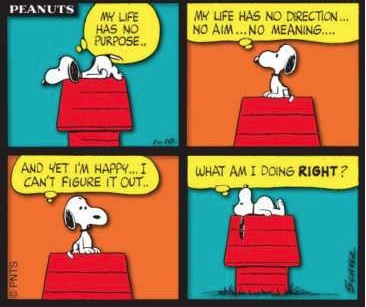 Snoopy (aka Charles Schultz) thinks his life has no meaning, but he is happy. It’s funny because it goes against a preconception. Slavoj Žižek (a philosopher) tells a story of a worker suspected of stealing:
Snoopy (aka Charles Schultz) thinks his life has no meaning, but he is happy. It’s funny because it goes against a preconception. Slavoj Žižek (a philosopher) tells a story of a worker suspected of stealing:
 “Every evening, as he leaves the factory, the wheelbarrow he rolls in front of him is carefully inspected. The guards can find nothing. It is always empty. Finally, the penny drops: what the worker is stealing are the wheelbarrows themselves…” (Violence).
“Every evening, as he leaves the factory, the wheelbarrow he rolls in front of him is carefully inspected. The guards can find nothing. It is always empty. Finally, the penny drops: what the worker is stealing are the wheelbarrows themselves…” (Violence).
Humour is like that – so is amusement and enjoyment. It’s under your nose. Lighten your wheelbarrow.
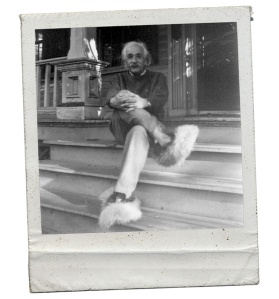 Why is purpose and meaning associated with happiness? The Dalai Lama (aka Lhamo Thondup) said between giggles, “men should have a purpose.” He also said, “The purpose of our lives is to be happy” (29 Dalai Lama quotes).
Why is purpose and meaning associated with happiness? The Dalai Lama (aka Lhamo Thondup) said between giggles, “men should have a purpose.” He also said, “The purpose of our lives is to be happy” (29 Dalai Lama quotes).
Perhaps purpose and result are the same thing.
Meaning is in the thing itself. Just as a flower flowers to flower, you are you to you. Enjoy to enjoy to enjoy. It’s nuclear and self-fulfilling.


 They rattle on. “I’m really enjoying this car. Are you?” “I love it,” says the passenger.
They rattle on. “I’m really enjoying this car. Are you?” “I love it,” says the passenger.

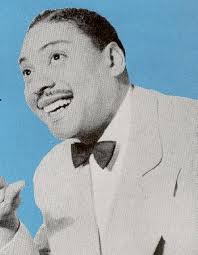
 It’s like what Chris Rock said in Comedians in Cars when Jerry asked him what he thought of a car. Chris Rock said, “I like you Jerry… everything is about the company … If we were in a cab, we would probably be having the same exact conversation.”
It’s like what Chris Rock said in Comedians in Cars when Jerry asked him what he thought of a car. Chris Rock said, “I like you Jerry… everything is about the company … If we were in a cab, we would probably be having the same exact conversation.”

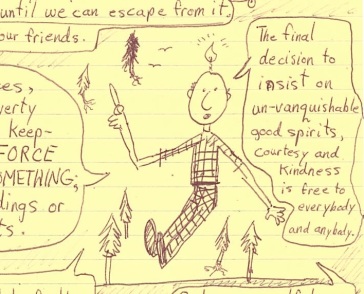
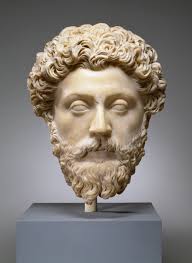



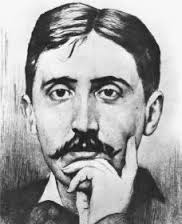






 With imagination (and those mirror neurons), we see from another person’s mind and make choices knowing that another’s well-being is as our own. Kindness towards another is advanced self-interest.
With imagination (and those mirror neurons), we see from another person’s mind and make choices knowing that another’s well-being is as our own. Kindness towards another is advanced self-interest. Train yourself to enjoy like it’s an Olympic event and you’re an enjoyment athlete. Even when you lose, you lose well. Enjoyment hangs like grapes picked like
Train yourself to enjoy like it’s an Olympic event and you’re an enjoyment athlete. Even when you lose, you lose well. Enjoyment hangs like grapes picked like